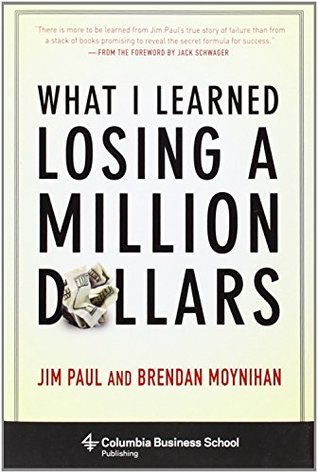More on this book
Community
Kindle Notes & Highlights
Success can be built upon repeated failures when the failures aren’t taken personally; likewise, failure can be built upon repeated successes when the successes are taken personally.
Personalizing successes sets people up for disastrous failure. They begin to treat the successes totally as a personal reflection of their abilities rather than the result of capitalizing on a good opportunity, being at the right place at the right time, or even being just plain lucky. They think their mere involvement in an undertaking guarantees success.
“This is a game and all these clowns are doing is trying to drive me crazy,”
You can either play the system or you can let the system play you. Pick one.
Don’t get all upset about the things you can’t do. If you can’t do something, pay someone else who can and don’t worry about it.
One of the oldest rules of trading is: If a market is hit with very bullish news and instead of going up, the market goes down, get out if you’re long. An unexpected and opposite reaction means there is something seriously wrong with the position.
if you learn why people lose and thereby control losses, profits will follow.
Losing money in the markets is the result of either: (1) some fault in the analysis or (2) some fault in its application.
Knowing what causes something is the first step in preventing it from going into effect.
Somehow, the concepts profit and loss get confused with win and lose and right and wrong.
Loss is not the same as wrong, and loss is not necessarily bad.
someone could actually internalize an external loss; the player or spectator could take the loss of the game as a personal matter and internalize what is properly an external loss.
Because the game is a discrete event—an activity with a defined ending point. However, internalizing an external loss is a lot easier to do with the other type of loss-producing activity: a continuous process
If you introduce the behavioral characteristics of betting or gambling into a continuous process, you are leaving yourself open to enormous losses.
tendency to overvalue wagers involving a low probability of a high gain and to undervalue wagers involving a relatively high probability of low gain.
interpret the probability of successive independent events as additive rather than multiplicative.
run of successes, a failure is mathematically inevitable, and vice versa. This is known as the Monte Carlo fallacy.
psychological probability of the occurrence of an event exceeds the mathematical probability if the event is favorable and vice versa.
most common fallacy to which market participants are susceptible is money odds vs. probability odds.
The basic distinction between the individual and the crowd is that the individual acts after reasoning, deliberation, and analysis; a crowd acts on feeling, emotion, and impulses.
Speculating is the application of intellectual examination and systematic analysis to the problem of the uncertain future.
Anytime someone says he can’t get out because he’s losing too much, he has personalized the market; he just doesn’t want to lose face by realizing the loss.
before you decide to get into the market you have to decide where (price) or when (time) or why (new information) you will no longer want the position.
After you know where you want to get out of the market, then you can ascertain whether and where you are comfortable getting into the market.
use scenario analysis to clarify risk and uncertainty and plan for the future.
refrain from answering until you can think about the subject. Following this approach keeps you objective
Having tied your self-worth to the vicissitudes of factors beyond your control, you will be primarily concerned with protecting your ego rather than trying to determine an appropriate course of action.
your self-image should not be a function of what you have accomplished but how you have gone about doing it.


